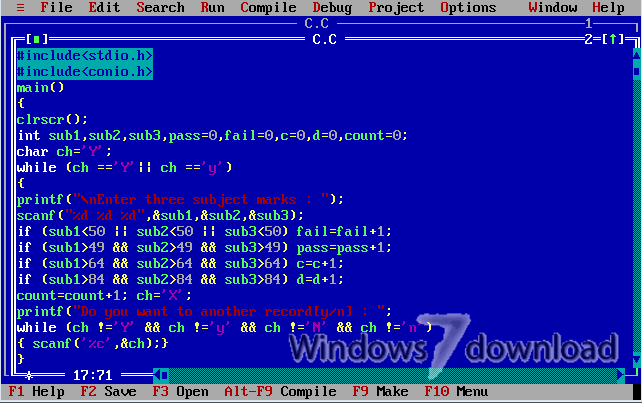

- #TURBO BORLAND C MANUALS#
- #TURBO BORLAND C MANUAL#
- #TURBO BORLAND C FULL#
- #TURBO BORLAND C SOFTWARE#
- #TURBO BORLAND C CODE#
Inside Turbo C subscription form, PART# 14CL - COM09, SUI: 14E 112

Order form for 3.5" disks, CODE:VZ02, PART # AACL-ALL17, BOR 1058A

Technical support instruction sheet, PART # AACL-ALL06, BOR 0556A
#TURBO BORLAND C CODE#
Turbo C 2.0 Runtime Library Source Code order form. Turbo Languages catalog, Part # MK CT-BOR011, BOR 1047A Includes the following printed materials:
#TURBO BORLAND C MANUAL#
Looks like 1.5 used the 1.0 manual but added a "Turbo C 1.5 Additions & Enhancement" manual. Turbo C 1.5, dated 12/10/87 1:05a, diskette part number BOR 0249A with blue twisty. Turbo C 1.0, dated 6/3/87 1am, diskette part number BOR 249 with red twisty The experts there can give you advice on which product will meet your needs. If you don't find the information you need below, we recommend the usenet newsgroups news: and news:++. Information on other Borland/Inprise products. EMS is not affiliated with Borland, Inprise, or any other vendor. While you may find older versions of development tools in many places, links to the old/used programming tools sales pages of EMS Professional Software, this page's sponsor, are provided for your convenience. This document lists brief descriptions of current and older development tools for the PC, along with notes and a brief list of features. Citing their user interface and continued emphasis on speed, the magazine stated that "for rapid prototyping there's not much better".Version information for older Borland/Inprise C Compilers Borland®/Inprise® C Compiler Versions Features Reception īYTE in 1989 listed Turbo C and Turbo Pascal as among the "Distinction" winners of the BYTE Awards. In 2006, Borland's successor, Embarcadero Technologies, re-released Turbo C and the MS-DOS versions of the Turbo C++ compilers as freeware. The C++ compiler was developed under contract by a company in San Diego, and was one of the first "true" compilers for C++ (until then, it was common to use pre-compilers that generated C code, ref. With the release of Turbo C++ 1.0 (in 1990), the two products were folded into one and the name "Turbo C" was discontinued. Turbo C 2.0 was also released (in Germany only) for the Atari ST the program was not maintained by Borland, but sold and renamed PureC. It was also available bundled with Turbo Assembler and Turbo Debugger. Version 2.0 (late 1988) featured the first "blue screen" version, which would be typical of all future Borland releases for MS-DOS. This version introduced the header file (which provided fast, PC-specific console I/O routines). It was shipped on five 360 KB diskettes of uncompressed files, and came with sample C programs, including a stripped down spreadsheet called mcalc.
#TURBO BORLAND C MANUALS#
It included more sample programs, improved manuals and bug fixes. Version 1.5 (January 1988) was an incremental improvement over version 1.0.
#TURBO BORLAND C FULL#
It allowed inline assembly with full access to C symbolic names and structures, supported all memory models, and offered optimizations for speed, size, constant folding, and jump elimination.
#TURBO BORLAND C SOFTWARE#
Like many Borland products of the time, the software was bought from another company (in this case Wizard C by Bob Jervis ), and branded with the "Turbo" name. Version 1.0 (May 13, 1987) offered the first integrated development environment for C on IBM PCs. While Turbo Pascal was successful with hobbyists and schools as well as professional programmers, Turbo C competed with other professional programming tools, such as Microsoft C, Lattice C, and Watcom C. Turbo C has similar properties to Turbo Pascal: an integrated development environment, a fast compiler (though not near the speed of Turbo Pascal), a good editor, and a competitive price. Borland followed up that success by releasing Turbo Basic, Turbo Prolog, and in 1987, Turbo C. In the early 1980s, Borland enjoyed considerable success with their Turbo Pascal product and it became a popular choice when developing applications for the PC.


 0 kommentar(er)
0 kommentar(er)
